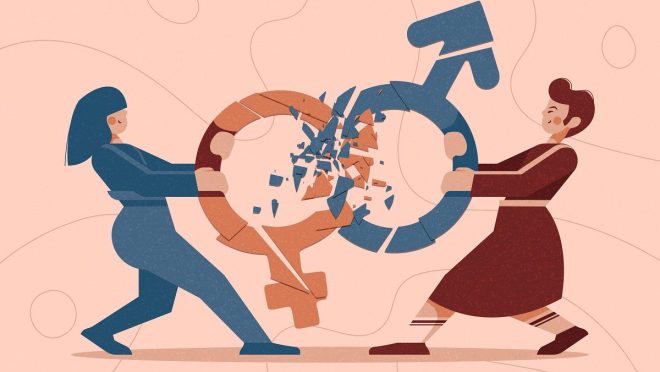Shattering stereotypes: How to raise a generation free from gender bias
Shattering stereotypes: How to raise a generation free from gender bias

Sadia was driving herself and her brother Sadik to their grandparents’ place during vacations while heads turned to criticise her for driving as a female.
Upon reaching the destination, Sadik served the delicious meal he had prepared for his grandparents while getting shamed for being so involved with cooking as a man. They also remarked that Sadia was the one who should’ve cooked.
Familiar incidents, aren’t they? Under ideal circumstances, both of them should have been appreciated for their roles. As pathetic as it gets, gender biases exist in our society even in 2024. The root cause of this is the lack of understanding regarding gender roles among the masses and gender sensitisation among children.
It is easier to change generations for the better by educating children because children’s brains are moldable and they are naturally curious. And thus, gender sensitisation should begin early, even before formal schooling starts.
Dolls and cars should be introduced to children as being gender-neutral. They should be encouraged to explore activities traditionally associated with the opposite sex. Besides, storybooks and games that depict positive portrayals of men and women in diverse roles can be useful tools in the process.
Unfortunately, our society is predominantly biased towards men. Thus, it is important to instil progressive and healthy values among boys from a very young age as much as it is to raise awareness among girls about their rights.
How to combat the battle
At present, a lot of organisations are in force to raise awareness against gender discrimination and sexual harassment. To speak of one such organisation,
WeMen View was founded with a view to countering Gender-based violence (GBV) and violence against children by concentrating on Men/Boys through changing the pre-existent gender perceptions in Bangladesh and developing a vivid concept of consent.
To achieve this, they conduct workshops at different schools to introduce concepts of consent, personal space, gender roles, good-touch and bad-touch, bullying, etc., and teach intervention techniques to deal with unwanted situations.
Role-playing scenarios and discussions are also incorporated within the workshops to help children understand how to speak up, offer support, and report incidents to trusted adults. And to attain their trust, parents and teachers should try and foster open communication with children to create a safe space where children feel comfortable discussing their experiences with gender discrimination, sexual harassment, and violence, whether as victims or witnesses. Their issues should be addressed through active listening and non-judgmental responses.
In a recent workshop at Mohila Somiti School, WeMen View distributed a survey form among the students to learn about their pre-established ideas about gender roles.
Unfortunately, even in 2024, the innocent minds of children are infiltrated with the ideas of stereotypical gender roles and discrimination.
Workshops and sessions as such can teach the children to protect themselves under vulnerable circumstances and enable them to use their voices against discrimination. In a method even better, these topics should be incorporated within the curriculum.
Subjects like social studies, arts, business, and even science can be used to explore historical and contemporary figures who challenged gender norms, discuss the importance of consent and healthy relationships, and debunk media portrayals that perpetuate stereotypes.
Besides, equipping children with bystander intervention skills will empower them to challenge stereotypes and take a stand for others facing discrimination.
The role of parents and teachers
Adults serve as powerful idols for children. By embodying progressive gender roles, parents and teachers can dismantle biases at the root. This means reflecting on their own upbringing and unconscious biases, using inclusive language that celebrates diversity, and creating environments that empower both girls and boys.
Encouraging girls to explore traditionally masculine activities and any career path they want builds confidence, while engaging boys in conversations about consent and healthy masculinity fosters a generation that respects equality and actively stands against gender-based violence.


